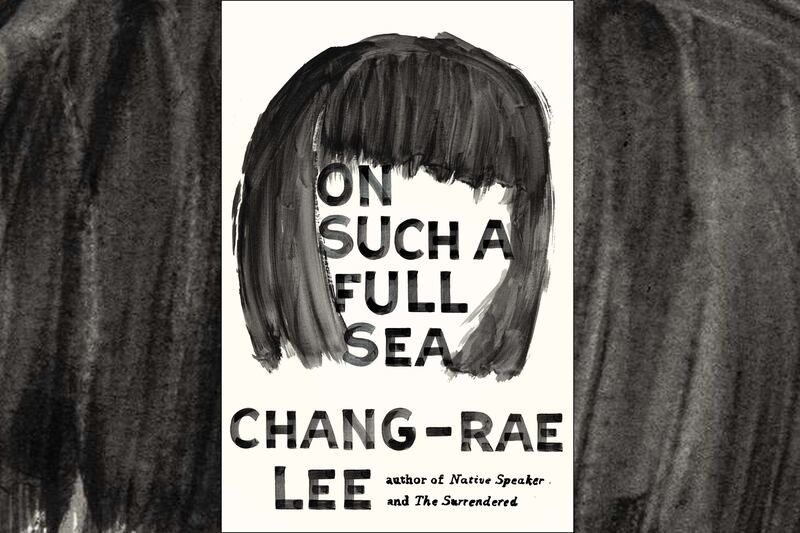A significant majority of Americans—67 percent, per Bloomberg—believe that the country is headed in the wrong direction. It is a little surprising, given the NSA surveillance scandal, the HealthCare.gov fiasco, and persistent long-term unemployment that anyone is still optimistic or naive enough to argue otherwise. But then, there are wrong directions and there are wrong directions. When one’s anxieties threaten to get out of hand, nothing lends a welcome bit of perspective and peace of mind like a well-crafted and frightening dystopia. There is comfort to be had in contemplating how much uglier life could be, out in the wasteland with the Lord Humungus.
Chang-Rae Lee’s On Such a Full Sea depicts a future America that headed in the wrong direction with a vengeance, taking social stratification to grotesque lengths and leaving the vast majority of its people vulnerable to fear, privation, and, ultimately, each other. The rich live in walled cities called Charters. Dead cities like Baltimore and Detroit, rebranded here as B-Mor and D-Troy, are labor facilities for an immigrant population from catastrophically pollution-benighted China. In between are the “open counties,” characterized by a Hobbesian bellum omnium contra omnes, whose denizens have nothing to offer the Charter elites and are thus left to suffer on their own.
The primary function of B-Mor is food production. It is in a fish hatchery of sorts that Lee’s sixteen-year-old heroine, Fan, works as a tank diver, “easily able to hold her breath for two minutes or more while she scrubbed and vacuumed and replaced tubing and filters.” Lee’s first-person plural narrator, the collective voice of B-Mor, purports to be “happy enough” with the security of having work, a schedule, a regimented life, but Fan is the fly in the ointment, unsatisfied with her lot and unwilling to ignore the questions it raises. Chief among these is: what happened to Reg, the father of her unborn child, who vanished from B-Mor in a manner suggestive of a political disappearance? It is in search of Reg that Fan takes to the open counties.
ADVERTISEMENT
The open counties, unfortunately, turn out to be well-worn territory, a bleak backdrop against which Fan learns the obligatory post-apocalyptic lessons that it can be hard to know who to trust and that people will do anything to survive. She meets strangers who, like Fan herself, are so perfunctorily sketched as to be more like figures from folklore than characters in a novel. This is effective at first, recalling fabulistic works like Doris Lessing’s The Story of General Dann and Mara’s Daughter, Griot and the Snow Dog, but in time it becomes clear that On Such a Full Sea is short on incident as well as psychology. Fan’s passage through the counties is a little too swift, its complications resolved a bit too tidily.
It is upon Fan’s arrival at a Charter that the novel takes some less predictable turns. Fan’s new companions are attempting to strike a deal with members of the Charter, called Seneca Hamlet, for medicine and equipment, and Fan is the payment. The reader supposes, given the brutality of this world, that Fan will become a sex slave; she is, in fact, abortively assaulted by Mister Leo, one of her new masters. But it is for Miss Cathy, the lady of the house, that Fan and seven other young girls are kept as pets, confined to Miss Cathy’s suite. The eyes of the seven have been modified to make them look like those of an anime character: “[T]here was also a welling of wistfulness in those big brown discs, as if they were all quietly longing for someone or something, that they would always be searching.”
Absurd—or oneiric, if one is to be charitable—though this scenario may sound, it is the emotional and thematic crux of On Such a Full Sea. The girls’ fate echoes that of the domestic servants in George Saunders’s story “The Semplica-Girl Diaries” as well as, in a deceptively benign way, the butchered women in Bluebeard’s cabinet. Just as the residents of B-Mor are prisoners of their own misguided “satisfaction,” Miss Cathy’s pets are easily kept as property because they have been born into a world that grossly misunderstands the value of a human life. Their main task, all the more dehumanizing for its triviality, is to take turns sleeping in a bed next to Miss Cathy’s, with Miss Cathy “arising at some point to switch places, something about the temperature and smell of a girl’s just-vacated bed helping Miss Cathy to go back to sleep after she awoke from her nightly bad dream.”
Lee is at his best when skewering the delicacy, self-indulgence, and neurosis of the elites, and it more than compensates for the at times tossed-off quality of his adventure narrative. Here he gets in a dig at the elites’ limitless appetite for gawking at the lower orders: “Maybe Charter people don’t ultimately care about what happens outside their gates, but they’re certainly curious, and so you see more and more characters like us popping up in the shows.” (This being “B-Mor” and all, it’s difficult not to picture some trustafarian effusing about The Wire.) Here he mocks their dietary anxieties: “Charters are famously nervous, for despite their wealth and security and self-satisfied demeanors, they are obsessed with minimizing hazards of any kind, and are perhaps wracked most of all by the finally unknowable dangers of what they ingest.”
Not quite: They are wracked most of all by fear of illness and death, and the specter of a condition called, without much subtlety, “C,” looms over the story. Medical research, genetic testing, and jealously rationed health care are the obsession of everyone in the Charters, just as they are among the elites of our present day. A reader who projects his own enlightened attitudes onto Lee’s book most likely will read it as a parable about inequality of income or opportunity, or the great tragedy that is unequal access to safeguards against human frailty. Those themes are, of course, present in the novel, but they are, whatever Lee’s occasionally obscure intentions, far from the whole story.

It is both a strength and a weakness of On Such a Full Sea that it is, alas, a sloppy novel. Lee’s prose is often quite beautiful, but as often it clumsily switches idioms, sounding nothing whatsoever like the oppressed grunts meant to be narrating it. It similarly refuses to choose between the folkloric and science-fictional modes, which makes it difficult to decide what spirit to read it in. The fact of Fan’s pregnancy rarely enters her mind, as though Lee introduced it to add emotional heft and promptly forgot about it. And the narrative conceit ultimately makes no sense: B-Mor is ostensibly telling a tale it has invented about Fan, its hero or liberating myth, but that tale is at once too detailed, too sordid, and too ambiguous for the reader to believe it would occur to, let alone inspire, an oppressed people.
The audience to which the dreamlike chaos of On Such a Full Sea speaks, subversively, is the audience most like its Charter denizens: our own American elite. It seems at every turn to mock the pursuit of comfort and security, the fear of chance and the unknown. It is almost as though Lee believes that the most frightening thing about the world he has created is not that it is too dangerous to live in, but that for many of its inhabitants it is not dangerous enough to lend life genuine meaning—which is why the reckless Fan is a hero the moment she steps outside B-Mor. If there is a warning implicit in On Such a Full Sea, it is that the world without “open counties” is the one not fit for human inhabitation.






